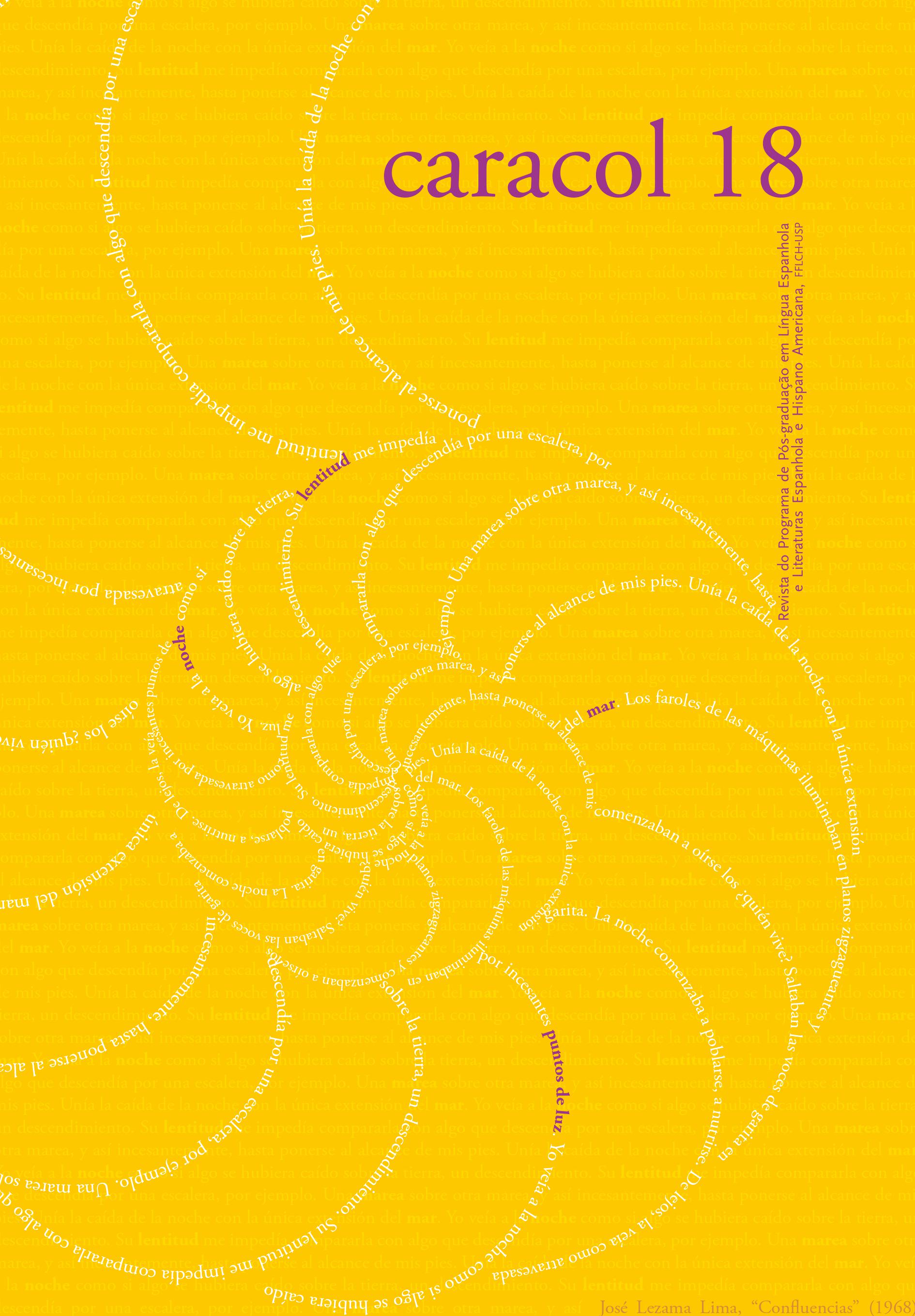Para uma Reinterpretação de Cien Años de Soledad no Contexto da Globalização
DOI:
https://doi.org/10.11606/issn.2317-9651.v18i18p434-451Palavras-chave:
Cien Años de Soledad, Gabriel García Márquez, Romance Latino-Americano, GlobalizaçãoResumo
Cien Años de Soledad (1967) é um dos livros mais lidos e comentados na história da literatura de língua espanhola. Já nos anos 60, o romance de Gabriel García Márquez se tornou a primeira obra de ficção latino-americana a alcançar a marca de 100.000 exemplares publicados anualmente. A partir de 1982, então, com a conquista do Prêmio Nobel de Literatura pelo autor, sua projeção global se tornou ainda maior. No campo acadêmico, um dos principais motivos para a continuidade dessa proeminência parece ser a crescente legitimidade dos estudos pós-coloniais e da chamada world literature nas principais universidades do planeta. Mas se, por um lado, é evidente que o interesse mundial pela obra segue intenso, por outro lado, a narrativa de García Márquez parece ainda mal situada em meio ao quadro literário das décadas de 50 e 60 ao qual pertence. Como Cien Años (...) se localiza em relação ao panorama em questão? Como sua forma dialoga com as propostas de outros escritores relevantes nesse âmbito? Para responder essa pergunta, o presente artigo sugere que Cien Años (...) seja uma das primeiras obras pós-modernas na história da América Latina, razão pela qual deve ser discutida à luz do tema da globalização.
Downloads
Referências
Anderson, Jon Lee. “The power of García Márquez”. The New Yorker, New York,27 set. 1999.Disponível em: https://www.newyorker.com/magazine/1999/09/27/the-power-of-garcia-marquez. Acesso em 20 nov.2018.
Anderson, Perry. “Modernity and revolution”. In: New Left Review, 1-144, 1984, 2-15.
Avelar, Idelber. Alegorias da derrota:a ficção pós-ditatorial e o trabalho do luto na América Latina. Tradução de Saulo Gouveia. Belo Horizonte: Editora UFMG, 2003.
Benjamin, Walter. “O narrador”. In: Benjamin, Walter. Magia e técnica, arte e política – obras escolhidas. 8. ed. Tradução de Sérgio Paulo Rouanet. Rio de Janeiro: Brasiliense, 2012, 197-221.v. 1.
Beverley, John. Against literature. Universityof Minnesota Press, 1993.
Bloom, Harold. Bloom’s Guides: One Hundred Years of Solitude. New York: Chelsea
House Publishers, 2006.
Cosoy, Natalio. “12 curiosidades de las más de 100 ediciones de ‘Cien años de soledad’, elclásico de Gabriel García Márquez que cumple 50 años”. BBCMundo, Bogotá, 30 maio2017. Disponível em: https://www.bbc.com/mundo/noticias-america-latina-39536986. Acessoem07 set. 2017.
Faulkner, William. “An introduction toThe sound and the fury”. In: Meriwether, James (org.). A Faulkner miscellany. Jackson: University Press of Mississippi, 1974, 156-161.
García Márquez, Gabriel. Cien años de soledad. Madrid: Real Academia Española, 2007.
García Márquez, Gabriel.“A Solidão da América Latina”. Tradução: G. J. Creus. In:
RevIU – Revista do Instituto Mercosul de Estudos Avançados – Universidade da Integração Latino-Americana. Nº 1. Foz do Iguaçu, 2014, 12-14.
Jameson, Fredric. Pós-Modernismo: lógica cultural do capitalismo tardio. Tradução de Maria Elisa Cevasco, Iná Camargo Costa. São Paulo: Ática, 1996.
Jameson, Fredric. Modernidade singular. Tradução de Roberto Franco Valente. Rio de Janeiro: Civilização Brasileira, 2005.
Jameson, Fredric. “No magic, no metaphor”. In: London Review of Books,39-12, 2017, 21-32.
Ludmer, Josefina. Cien años de soledad: una interpretación. Buenos Aires: Editorial Tiempo Contemporáneo, 1974.
Mandel, Ernest. O capitalismo tardio. Tradução de Carlos Eduardo Silveira Matos, Regis de Castro Andrade, Dinah de Abreu Azevedo. São Paulo: Abril, 1985.
Mignolo, Walter. “Coloniality of power and de-colonial thinking”. In: Cultural Studies, 12-2-3, 2007, 155-167.
Roque-Baldovinos, Ricardo. “The ‘epic novel’: charismatic nationalism andthe avant-garde in LatinAmerica”. In: Cultural Critique, 49, 2001, 58-83.
Vieira, Felipe de Paula Góis. “O legado de García Márquez e o impacto de ‘Cem anos de solidão’ na literatura hispano-americana”. Jornal da Unicamp, Campinas, 05 maio 2017. Disponível em: https://www.unicamp.br/unicamp/ju/noticias/2017/05/09/o-legado-de-garcia-marquez-e-o-impacto-de-cem-anos-de-solidao-na-literatura. Acesso em 07 set. 2018.
Publicado
Edição
Seção
Licença
Copyright (c) 2019 Gabriel Cordeiro dos Santos Lima

Este trabalho está licenciado sob uma licença Creative Commons Attribution-NonCommercial 4.0 International License.
Autores que publicam nesta revista concordam com os seguintes termos:
- Autores mantêm os direitos autorais e concedem à revista o direito de primeira publicação, com o trabalho simultaneamente licenciado sob a Licença Creative Commons Attribution que permite o compartilhamento do trabalho com reconhecimento da autoria e publicação inicial nesta revista.
- Autores têm autorização para assumir contratos adicionais separadamente, para distribuição não-exclusiva da versão do trabalho publicada nesta revista (ex.: publicar em repositório institucional ou como capítulo de livro), com reconhecimento de autoria e publicação inicial nesta revista.
- Autores têm permissão e são estimulados a publicar e distribuir seu trabalho online (ex.: em repositórios institucionais ou na sua página pessoal) a qualquer ponto antes ou durante o processo editorial, já que isso pode gerar alterações produtivas, bem como aumentar o impacto e a citação do trabalho publicado (Veja O Efeito do Acesso Livre).




